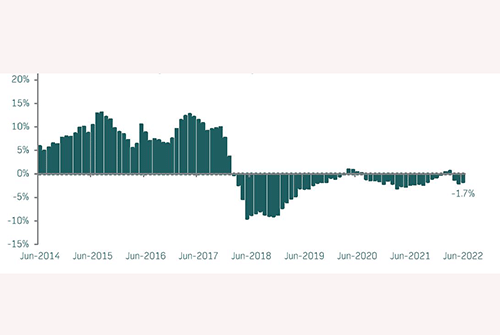An unexpected setback, mainly driven by price contraction of 7.7% year-on-year (y/y) within the two-bedroom rental segment, has pushed down the 12-month average rent level to N$6 102. This is the lowest level seen in six years. FNB market researcher Frans Uusiku highlighted the impact of sudden economic shocks on households, characterised by rising interest rates, inflation and fuel prices.
The latest FNB residential rental report for the second quarter of 2022 shows that following two consecutive months of growth, the 12-month average growth in the FNB rental index retreated into negative territory - posting a contraction of 1.7% at the end of June 2022. Similarly, the one-bedroom and three-bedroom segments also disappointed on the downside albeit by a smaller degree, posting rental contractions of 0.3% and 1.8% y/y at the end of June 2022 to N$3 611 and N$9 446, respectively.
Conversely, the more than three bedrooms segment continues to sustain stability in the rental market on the back of improved tenant retention. In effect, this segment registered rental growth of 7.7% y/y, bringing the 12-months average rent to N$19 518 from N$18 129 recorded a year earlier. Consequently, the overall 12-months national weighted average rent came in at N$6 964 at the end of June 2022 from N$6 926 recorded over the same period of 2021.
“Although the rental market has recovered somewhat between the second half of 2021 and the first quarter of 2022, agents and landlords should continue to remain mindful of the negative effects of the current macroeconomic environment on tenants’ ability to pay their rent. The continued financial hurdles faced by consumers could force households to downscale their lifestyles by seeking out cheaper accommodation options, which would further derail a complete rental market recovery,” FNB stated.
On the flip side, rising interest rates and the subsequently reduced appetite to borrow may also mean that some higher-income tenants may decide to keep renting instead of buying their own properties, which will have the opposite effect.
“It is becoming increasingly more expensive to maintain a home compared to a year ago due to higher cost of building materials such as steel and other essential household amenities. Rising interest rates are also lifting bond instalments, yet it is difficult for landlords to pass on sharp cost increases to tenants in the current difficult economic environment. Looking ahead, we expect nominal rentals to continue to rise slowly in the next year or so but at a rate lower than the consumer inflation rate,” the FNB statement added. The latest rental report’s market analysis also indicates contractions across the regional markets. Jurisdictions reported significant reductions such as Oshakati (-29.6%), Ondangwa (-21.8%), Rehoboth (-18.1%), Rundu (-13.8%), Arandis (-12.8%), Windhoek (-8%), Walvis Bay (-5.6%) and Ongwediva (-2.5%). In contrast, Swakopmund recorded a surge in rental growth of 20.4% and continues to attract high demand for larger lifestyle properties in general. “This is not surprising given the impressive rise in residential building plans that have been approved and completed in Swakopmund relative to the rest of the country. This signals the growing attractiveness of the coastal region as an ideal jurisdiction for residential property investment,” the rental report reads.
Overall, Swakopmund accounted for 42.1% of the N$116 million value of building plans completed in May 2022, based on the Namibia Statistics Agency Building Plans Completed Index.
Moreover, overall rental deposits across the country contracted by 6.2% in the 12 months to June 2022, compared to contractions of 16.4% and 22.8% recorded at the end of the first quarter of 2022 and the corresponding quarter of 2021, respectively. The rental report stated: “Whilst rental deposit requirements remain largely a voluntary practice in the Namibian context owing to a regulatory gap, the notable rebound in deposits payable may appear to highlight a continuous slow recovery of the rental market.”


